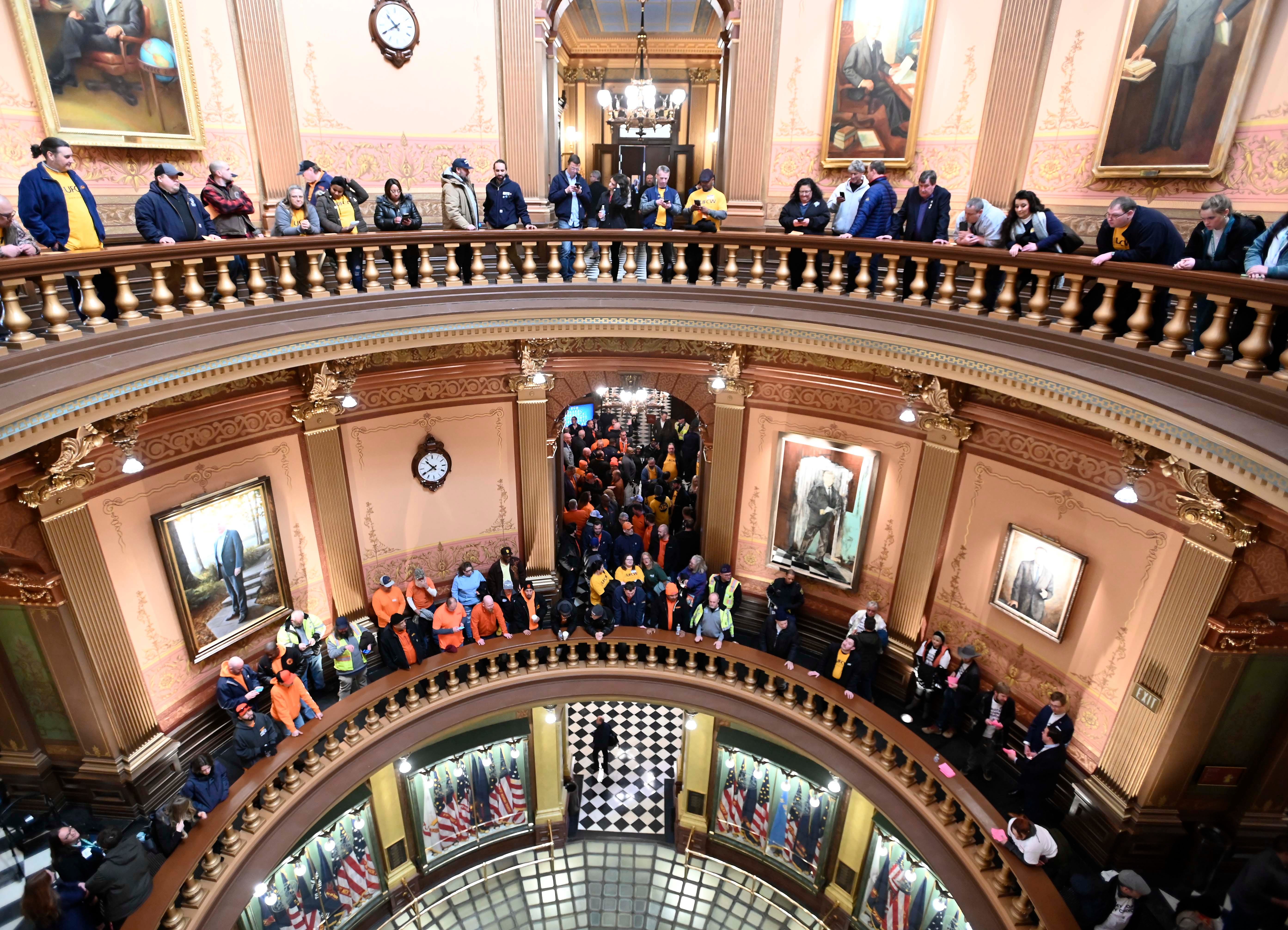Michigan Senate approves repeal of right-to-work law, return of prevailing wage
 Craig Mauger
Craig MaugerLansing — Organized labor was on the verge of scoring landmark political victories Tuesday as the Michigan Senate voted to repeal the 2012 right-to-work law that made union membership optional at unionized workplaces and re-establish a prevailing wage standard for state projects.
The proposals passed along party lines 20-17, marking a turning point in Michigan politics, as Democrats, who won majorities last fall in the House and Senate for the first time in 40 years, begin unraveling policies that Republicans considered among their top achievements in the past decade.
State Sen. Darrin Camilleri, D-Trenton, said the votes demonstrated Michigan is “restoring the union promise” and taking a step toward a new era of governance.
"Today, we are showing the world that Michigan is not only where we make things and build things, it’s where the people who do so are respected," Camilleri said.

But Republican lawmakers blasted the bills, arguing they would damage the state's ability to compete for jobs, would take a choice away from workers and would financially benefit labor groups that help finance Democrats' campaigns. The right-to-work law makes paying dues or agency fees to a union optional.
“This isn’t about policy," said Sen. Thomas Albert, R-Lowell. "It’s about politics. This is basically a political fundraiser being launched at the state Capitol.”
A similar package of three bills passed the House last week. The Senate switched two of the House-approved bills out for proposals that originated in the Senate, meaning they will have to go back to the House before reaching Democratic Gov. Gretchen Whitmer's desk.
Union supporters had a heavy presence at the Capitol Tuesday, with people filling three meeting rooms for a committee hearing Tuesday morning and then packing the Senate's gallery for the votes Tuesday afternoon. There was applause in the Senate chamber and in the halls of the Capitol after the first vote on repealing right-to-work.
Labor leaders contended the past moves of Michigan Republicans eroded the ability of unions to collectively bargain for workers and cut into wages.
“It is a power grab, pure and simple," Ron Bieber, president of the Michigan AFL-CIO, told the Senate Labor Committee.

The right-to-work law, enacted a decade ago by former Gov. Rick Snyder, a Republican, prohibited requirements that workers pay union dues or fees as a condition of their employment.
In December 2012, thousands of protesters showed up at the state Capitol as Republicans advanced bills to institute right-to-work. Snyder signed them on Dec. 11. At the time, he said, "Workers deserve the right to decide for themselves whether union membership benefits them."
The 2012 demonstrations, which gained national media attention, loomed over the Senate's votes. Camilleri said some of the same protesters who came to Lansing to speak against right-to-work in 2012 were there Tuesday to celebrate the repeal votes.
Senate Majority Leader Winnie Brinks, D-Grand Rapids, recalled being in Lansing in December 2012. She said thousands of workers' voices were ignored when Republicans controlled the Legislature with no committee hearing and a "swing of the gavel."
"The failed experiment of gutting Michigan workers' rights is soon to be over," Brinks said.
Since 2012, the number of union members in Michigan has fallen from 629,000 to 589,000 in 2022, according to data from the U.S. Bureau of Labor Statistics.
The new bills specifically allow employers to enter into an agreement "that requires all employees in the bargaining unit to share fairly in the financial support of the labor organization."

Business groups, including the Michigan Chamber of Commerce, spoke out against repealing right-to-work. Currently, 26 other states have right-to-work policies in place, according to the National Conference of State Legislatures.
“We oppose turning back the clock on this law,” said Wendy Block, senior vice president of business advocacy and member engagement at the Michigan Chamber of Commerce.
Forcing people to join unions turned workers into "indentured servants," said Sen. Jonathan Lindsey, R-Allen.
More:Whitmer plans to sign right-to-work repeal despite referendum promise
Sen. Roger Hauck, R-Mount Pleasant, a former member of the United Steelworkers, said people shouldn't be required to financially support unions as a condition of employment. Labor unions should have to prove their value, he said.
“Right-to-work shouldn’t affect any union in the state that’s doing it the right way," Hauck said.
The Senate version of the bills, like those approved by the House, included $1 million appropriations to respond to public inquiries and to "inform employers, employees and labor organizations about changes to their rights and responsibilities."
Under the Michigan Constitution, the appropriations would make the right-to-work repeal legislation referendum-proof. The 2012 Republican-authored right-to-work law also contained an appropriation that made it immune to a ballot box referendum.
Whitmer said Monday she intends to sign the bills repealing the right-to-work law, even with the appropriation. She has previously said she would veto bills that include appropriations to block referenda.
Opponents could gather a petition to put a proposed constitutional amendment on the ballot in 2024 to restore right-to-work, but it would require twice as many signatures: 446,198 instead of 223,099.
As for the prevailing wage policy, Republicans narrowly voted in 2018 to repeal the requirement that contractors pay union wages and benefits on state-funded construction projects. At the time, then-Senate Majority Leader Arlan Meekhof, a Republican from Grand Haven, said the repeal would save taxpayers money.
The Democratic bills restore the prevailing wage standard, which Sen. Veronica Klinefelt, D-Eastpointe, said would boost worker pay.
“Michigan has a long history with prevailing wages," she said. "And it’s rooted in the belief that workers have value and that we should compensate them fairly for the work that they do.”

The proposal would have "an indeterminate fiscal impact on state and local expenditures for construction projects," according to the nonpartisan House Fiscal Agency. The academic and policy literature on the economic effects of prevailing wage laws was decidedly contested, the agency said.
But Republicans said the prevailing wage measure would lead to higher costs for taxpayers on school and state construction projects.
Senate Minority Leader Aric Nesbitt, R-Porter Township, said Democrats didn't want to find a bipartisan compromise despite holding only narrow majorities.
"I can't take them seriously on economic development now," Nesbitt said.
Democrats added a $75,000 appropriation to the prevailing wage bill, which would also protect it against a referendum campaign.
Whitmer already used her administrative powers in 2021 to require state contractors on construction projects to pay prevailing wages.
cmauger@detroitnews.com